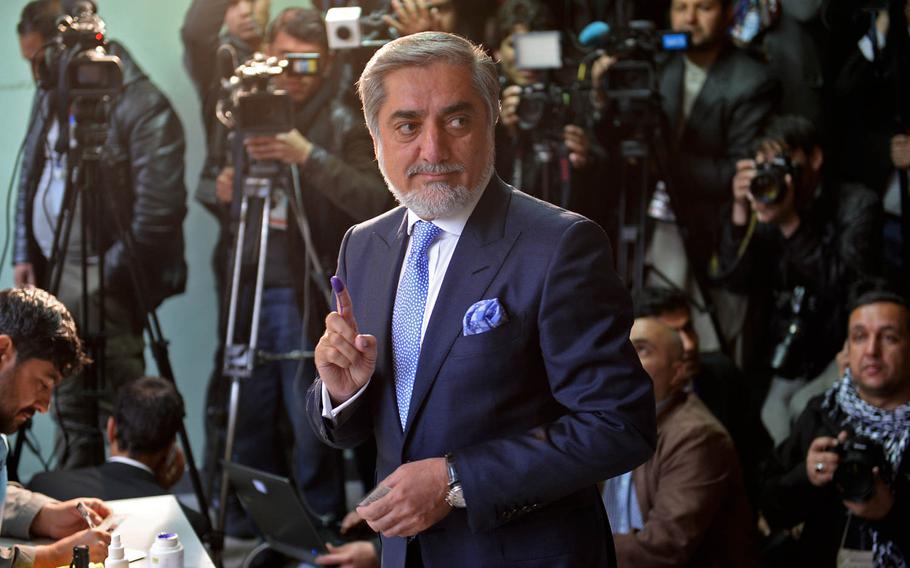
Afghan presidential candidate Abdullah Abdullah displays his ink-stained finger before voting at a high school in central Kabul on Saturday, April 5, 2014. (Josh Smith/Stars and Stripes)
KABUL — With roughly half the votes counted in Afghanistan’s presidential election, a rival of Hamid Karzai has opened up a commanding lead although still below the majority needed to avoid a run-off ballot.
Crucially, the votes counted were all “clean,” meaning they are not the subject of complaints that could later disqualify them, Mohammad Yousuf Nuristani, director of the Independent Election Commission, said on Sunday. In the 2009 presidential election, more than one million votes were thrown out due to fraud and other irregularities.
In the latest results Abdullah Abdullah, a former foreign minister who lost a controversial election to Karzai in 2009, garnered 44.4 percent of the votes, with former finance minister Ashraf Ghani getting 33.2 percent. Karzai, Afghanistan’s only president since the U.S. invasion ousted the ruling Taliban in 2001, is barred by the constitution from running for another term.
The results were based on nearly 3.5 million votes counted so far. Election officials estimate that 7 million Afghans went to the polls on April 5. The final results are scheduled to be released May 14.
In an interview with Stars and Stripes after the latest results were announced, Abdullah confidently predicted there will be no second round, predicting he will win outright, though he said he would bring some of his rivals into government were he to become president.
"Our idea is to form an inclusive government," he said.
Ghani officials declined to comment on the results.
If no candidate receives a majority in the first round, the top two vote-getters will square off in a run-off election. In that scenario, the support and endorsements of also-ran candidates could prove crucial, with the third- and fourth-placed candidates combining for 17 percent of the vote so far.
There have been reports of behind-the-scenes negotiations between some candidates about throwing their support to one of the frontrunners. At a press conference announcing the results, Nuristani condemned such deals.
“As far as this horse-trading, of course this is not a good thing in any country in the world but what can you do?” he said. “I don’t have any legal method to stop this.”
There’s also been talk of a possible negotiated settlement to avoid a potentially contentious run-off, which could raise ethnic tensions since Ghani is an ethnic Pashtun and Abdullah a Tajik.
"Whatever the results of the process, it should be something that brings the country together,” one Western official said.
The rise of Abdullah, who has been sharply critical of the president, has dampened concerns about Karzai meddling in the electoral process.
“The election turned into a real political contest, despite initial worries that the whole process might be rigged in favor of a candidate with support from the presidential palace,” said Graeme Smith, senior Afghanistan analyst for the International Crisis Group.
Still, many remain skeptical about the vote-counting process and independent election monitors have criticized both the Independent Election Commission and the Independent Electoral Complaints Commission, the main body responsible for resolving complaints of voting irregularities.
While observers have been allowed to see the vote counting, they have been largely shut out of meetings of both electoral bodies dealing with how they are adjudicating complaints, a process which could potentially lead to hundreds of thousands of ballots being disqualified, according to Jandad Spinghar, director of the Free and Fair Election Foundation of Afghanistan, the country's largest independent election observer group.
“In that case we still have a problem and we are trying to convince the IEC and ECC to give us access,” he said.
Nuristani brushed aside such criticisms, saying the vote counting is being done in a transparent manner.
“We promise we will safeguard the trust of the Afghan people who participated in the vote on election day,” he said.
The election, which would mark the first democratic transfer of power in Afghanistan’s history is crucial not only to the stability of the war-wracked nation, but also to the legacy of the U.S.-led war here, which has dragged on inconclusively for more than 12 years and seen support in Western countries plummet.
While early reports reflected a largely violence-free election, Afghan and U.S. military officials later admitted that there was widespread violence in rural areas on election day.
The Taliban staged a series of attacks in Kabul in the lead-up to the vote, though none in the capital on election day.
Zubair Babakarkhail contributed to this report.
druzin.heath@stripes.com Twitter: @Druzin_Stripes